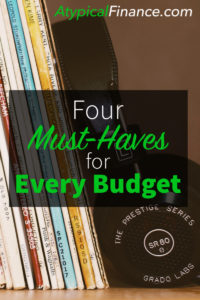A budget and pop music. Two things that are usually not compared together.
Have you listened to any pop music recently? Some songs can sound very much the same so you can’t really tell what artist is singing it. Other songs sound vastly different even though it’s still considered pop music.
Pop music these days can mean a variety of things but it generally refers to music that is the most popular at the time. The term in its modern usage originated in the 1950’s when jazz and big band standards were the most popular. This means that the likes of Frank Sinatra, Tony Bennet, and Ella Fitzgerald were all considered pop artists at one point rather than big band like they are today.
Pop music in the 1950’s all sounded similar but each artist had their own unique stylings. This is similar to how it is today. Even some of the most unique pop music sounds similar to “normal” pop music. Why? Because there are always certain aspects of pop music that can be considered “the essentials.”
A basic foundation is laid so a pop song will actually sound like pop. This can include a catchy hook or melody, a certain sound or beat to the drums, and generally simple lyrics.
What does this have to do with budgets?
Well, there are so many different budgeting methods out there that it only makes sense to create one that is going to work for you. You want something unique like a unique pop song. However, just like with pop music, there are certain things that you’ll want to include no matter what budget you use.
Here are four must-have things that you’ll want to include in your budget.
1) Saving
No matter what type of budget you’re using, no matter what your values are, it will be extremely rare for you to not have long-term goals to align with your values. You will need to save something.
If the company you work for has a 401K match, then this is a no-brainer. Elect to have enough of your paycheck taken out to at least get the max company match amount. You can save for vacations, your emergency fund, or any other future goal by setting up automatic transfers into a separate savings account.
 2) Emergency Fund
2) Emergency Fund
No matter what budget you are using, you’ll need some sort of emergency fund. Consider an emergency fund just as important as any other insurance policy. You’ve got homeowners insurance that will cover your place of dwelling, car insurance that will cover your vehicle (or most of it), and then you’ll need an emergency fund to cover other things that might break.
If you are working on paying off debt, then I would recommend saving a $1,000 emergency fund. If you are done paying off debt or have other goals, then having three to six months of expenses in an easily accessible online savings account would be ideal.
Again, your emergency fund size is up to you and what you feel comfortable with. If you feel comfortable with less, then you can try less. If you need more money in an emergency fund, then save as much as you need to feel comfortable.
The bottom line is that an emergency fund is a core element of any budget so it comes highly recommended.
3) Tracking Your Spending
With any budget, you need a way to track your spending. I use You Need a Budget, which is $84 a year. There are other free options as well, such as Mint or Personal Capital. You can also use a basic spreadsheet if you are pretty adept at Microsoft Excel or Google Sheets.
No matter what budget you’re using, you have to know where your money is going in order to make sure that you are on track for your goals as well as making sure you aren’t overspending. Even something as basic as checking your balance before making a purchase will go a long way. Track your spending to help you get ahead.
Tracking your spending can also make setting up your budget—as well as any future changes to your budget—easier because you will have a better grasp on what you’re spending. If you know how much money is going toward things like groceries and gas, then it’ll be easier to know how much you need to set aside for it to stay within budget.
4) Automation
Have you ever wanted to make life easier? Maybe you want to not spend so much time doing some things with your finances. Automation is the key to all of your problems! Okay, so I exaggerate a bit, but automating as much of your finances as you can will make sticking with your budget much easier.
I used to spend a bunch of time every month paying bills. I would sit down, probably for about an hour at least twice a month, and I would go through and pay every single bill. Thankfully I didn’t have to sit and write checks for everything. What I did have to do is go to each individual bill’s website and pay it manually…that is until I automated most of our bills.
Now, all but three of my bills are automated, and that’s only because I haven’t gotten around to automating those yet.
So why didn’t I do this sooner? Well, I have a very good reason…
I. Have. No. Idea.
Simple as that. I have no idea why I didn’t do this sooner. I love it!
Automation not only saves you time but can save you money as well. When was the last time you had a late bill? Credit card companies are especially notorious for charging a lot of money for late fees. Then, they are kind enough to raise your interest rate, too! Automation lets you say goodbye to late bills.
So what are some things you can automate? There are two main buckets you can automate.
Automate Your Bills
As I said, only three of my bills are not automated right now because I haven’t had time to set it up (i.e. I’ve been lazy). Automate all of your bills to save time and money. Many banks offer this feature and it’s relatively easy to set up.
If your bank doesn’t offer online bill pay, most bill provider’s offer a way to set up automatic payments through their website. Usually, you would set up a standard payment and then choose to allow it to recur. Many credit card companies have a separate menu selection for Autopay as well.
Automate Your Savings
This includes both short-term and long-term savings. Long-term savings is retirement and short term savings is for things like vacation and emergency fund.
You’ve heard of the term “pay yourself first,” right? This refers to putting money towards savings before anything else, even your bills. Also, a lot of us don’t have experience paying ourselves first because we pay our taxes out of our check before we even see it.
I prefer to treat saving as a bill. This way it’s listed in your budget with the bills and it has to be paid. You also don’t have to choose between your bills and your savings. Making it part of your budget will let you choose the right amount to save so it matches where you are in life and how much money you have after your bills and necessities are paid. This can easily be automated through your employer as a separate direct deposit or through your bank via recurring transfers.
Everything Has a Foundation
When you build a house, there’s always a foundation. There are other things in a house that are must-haves as well. Doors, windows, and walls are all things that come to mind. Without these, it wouldn’t be considered a complete house.
You won’t have to worry about any of these must-haves making your budget less personal either. Consider all of the different cars being made right now. There are many different styles of cars but they all have the basics—an engine, doors, a body, etc. Without these, you won’t have a car but having them does not detract from the personal feel of a car.
Without these four must-haves, your budget won’t function as well. If you’re not saving, besides not being able to meet your goals, you won’t be able to retire at some point. Without an emergency fund, you may be headed toward your goals and then get derailed by an emergency. If you aren’t tracking your spending, you won’t know where your money is going or how best to reach your financial goals. Lastly, automation will make your budget easier to manage and stick with. It’ll also save you time and money.
Try implementing these into the budget you create and watch what they can do for you. You’ll be amazed!



















